Related Research Articles

Hannah Arendt was a German-American historian and philosopher. She was one of the most influential political theorists of the 20th century.

Sophie's Choice is a 1979 novel by American author William Styron. The author's last novel, it concerns the relationships among three people sharing a boarding house in Brooklyn: Stingo, a young aspiring writer from the South, Jewish scientist Nathan Landau, and his lover Sophie, a Polish-Catholic survivor of the German Nazi concentration camps, whom Stingo befriends.

Margarethe von Trotta is a German film director, screenwriter, and actress. She has been referred to as a "leading force" of the New German Cinema movement. Von Trotta's extensive body of work has won awards internationally. She was married to and collaborated with director Volker Schlöndorff. Although they made a successful team, von Trotta felt she was seen as secondary to Schlöndorff. Subsequently, she established a solo career for herself and became "Germany's foremost female film director, who has offered the most sustained and successful female variant of Autorenkino in postwar German film history". Certain aspects of von Trotta's work have been compared to Ingmar Bergman's features from the 1960s and 1970s.

Janet McTeer is an English actress. She began her career training at the Royal Academy of Dramatic Art before earning acclaim for playing diverse roles on stage and screen in both period pieces and modern dramas. She has received numerous accolades including a Tony Award, a Olivier Award, a Golden Globe Award and nominations for two Academy Award and Primetime Emmy Award. In 2008 she was appointed an Officer of the Order of the British Empire (OBE) for her services to drama.
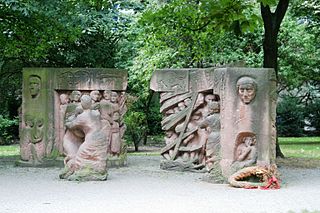
The Rosenstrasseprotest is considered to be a significant event in German history as it is the only mass public demonstration by Germans in the Third Reich against the deportation of Jews. The protest on Rosenstraße took place in Berlin during February and March 1943. This demonstration was initiated and sustained by the non-Jewish wives and relatives of Jewish men and Mischlinge,. Their husbands had been targeted for deportation, based on the racial policy of Nazi Germany, and detained in the Jewish community house on Rosenstrasse. The protests, which occurred over the course of seven days, continued until the men being held were released by the Gestapo. The protest by the women of the Rosenstrasse led to the release of approximately 1,800 Berlin Jews.
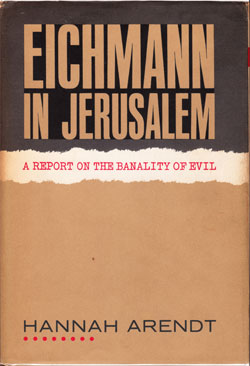
Eichmann in Jerusalem: A Report on the Banality of Evil is a 1963 book by the philosopher and political thinker Hannah Arendt. Arendt, a Jew who fled Germany during Adolf Hitler's rise to power, reported on the trial of Adolf Eichmann, one of the major organizers of the Holocaust, for The New Yorker. A revised and enlarged edition was published in 1964.

Barbara Sukowa is a German actress of screen and stage and singer. She has received three German Film Awards for Best Actress, three Bavarian Film Awards, Cannes Film Festival Award for Best Actress, Venice Film Festival Award, as well as nominations for European Film Awards, César Awards and Grammy Awards.
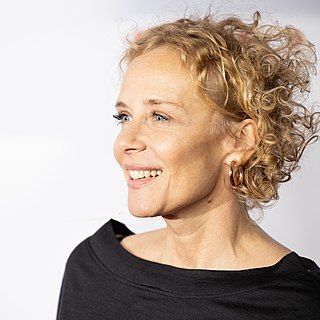
Katja Hannchen Leni Riemann is a German actress.

Marianne and Juliane, also called The German Sisters in the United Kingdom, is a 1981 West German film directed by Margarethe von Trotta. The screenplay is a fictionalized account of the true lives of Christiane and Gudrun Ensslin. Gudrun, a member of The Red Army Faction, was found dead in her prison cell in Stammheim in 1977. In the film, von Trotta depicts the two sisters Juliane (Christine) and Marianne (Gudrun) through their friendship and journey to understanding each other. Marianne and Juliane was von Trotta's third film and solidified her position as a director of the New German Cinema.
Rosenstraße is a 2003 film directed by Margarethe von Trotta, starring Maria Schrader and Katja Riemann. It deals with the Rosenstrasse protest of 1943.
Thekla Simona Gelsomina Reuten is a Dutch actress.

Aviva Kempner is a German-born American filmmaker. Her documentaries investigate non-stereotypical images of Jews in history and focus on the untold stories of Jewish people. She is most well known for The Life and Times of Hank Greenberg.

Angela Winkler is a German actress.

Vision is a 2009 German film directed by Margarethe von Trotta.
The New York Jewish Film Festival (NYJFF) is an annual festival in New York City that features a wide array of international films exploring themes related to the Jewish experience. The Jewish Museum and The Film Society of Lincoln Center work in partnership to present the NYJFF every January. Since its creation in 1992, the festival has more than doubled in size and scope. Screenings are typically followed by discussions with directors, actors and film experts. Audience participation is encouraged.

Larysa Kondracki is a Canadian producer, director and screenwriter. Her debut feature film, The Whistleblower, was released in 2011 and received nominations for six Genies at the 32nd Genie Awards, including Best Picture and Best Director. She has received international accolades for reporting on the stories of victims of trafficking in the former Yugoslavia.
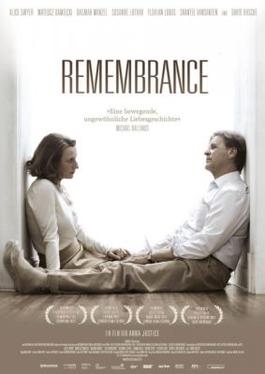
Remembrance is a 2011 German drama film directed by Anna Justice. A German-Jewish young woman and Polish young man fall in love and escape a Nazi concentration camp. As the film prologue notes, it is based on the true story of Jerzy Bielecki and Cyla Cybulska.
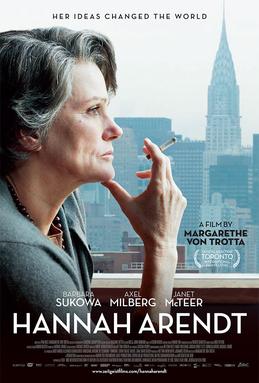
Hannah Arendt is a 2012 biographical drama film directed by Margarethe von Trotta and starring Barbara Sukowa. An international co-production from Germany, Luxembourg and France, the film centers on the life of German-Jewish philosopher and political theorist Hannah Arendt. The film, distributed by Zeitgeist Films in the United States, opened theatrically on 29 May 2013.

Jutta Lampe was a German actress on stage and in film. She was for 30 years a leading actress at the Schaubühne founded in Berlin by her husband Peter Stein, where she played both classical theatre such as Alkmene in Kleist's Amphitryon, and world premieres including Robert Wilson's Orlando for one actor, and roles that Botho Strauß created for her. She was also engaged at the Vienna Burgtheater and the Schauspielhaus Zürich. She appeared in more than twenty films from 1963, including lead roles in films by Margarethe von Trotta. Lampe was named Actress of the Year by Theater heute several times. Other awards included the Gertrud-Eysoldt-Ring and the Joana Maria Gorvin Prize for her life's work.
Pamela Gray is an American screenwriter.
References
- 1 2 3 Lovenheim, Barbara. "Pamela Katz: Scripting Hannah Arendt". nycitywoman.com. Archived from the original on 2016-03-24. Retrieved 2016-03-17.
- 1 2 Dunning, Jennifer (16 December 1987). "Mura Dehn, Dancer, as Subject and Chronicler". The New York Times.
- ↑ Sarris, Andrew (30 August 2004). "Rosenstrasse Wives Remembered By German Director von Trotta". Observer. Retrieved 2016-03-17.
- ↑ "Margarethe von Trotta and Barbara Sukowa by Sabine Russ - BOMB Magazine".
- ↑ "Rosenstrasse *". The Globe and Mail. 24 September 2004.
- ↑ Huttner, Jan Lisa (August 24, 2004). "Jan Chats with Pamela Katz about the screenplay for her new film, Rosenstrasse". FF2 Media. Retrieved April 27, 2020.
- ↑ Hall, Sandra (24 October 2013). "Remembrance review: Potent tale of love against a backdrop of horror". The Sydney Morning Herald. Retrieved 2016-03-17.
- ↑ Pamela Katz discusses REMEMBRANCE with Susana Styron. YouTube . Archived from the original on 2021-12-09.
- ↑ "Hannah Arendt Q&A". Vimeo. 17 June 2013. Retrieved 2016-03-17.
- ↑ "Pamela Katz". tisch.nyu.edu. Retrieved 2016-03-17.
- ↑ "THE PARTNERSHIP by Pamela Katz". Kirkus Reviews. Retrieved 2016-03-17.